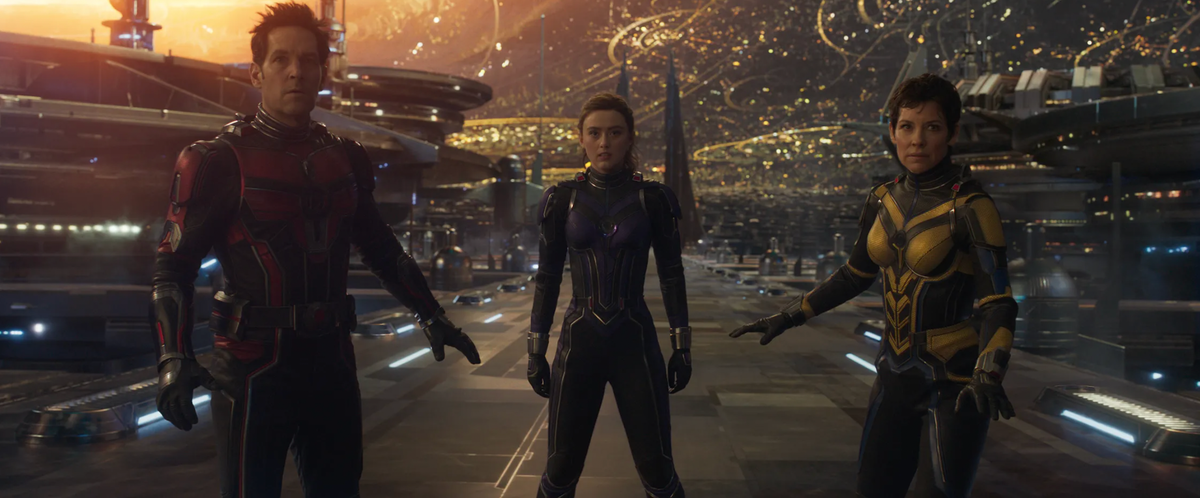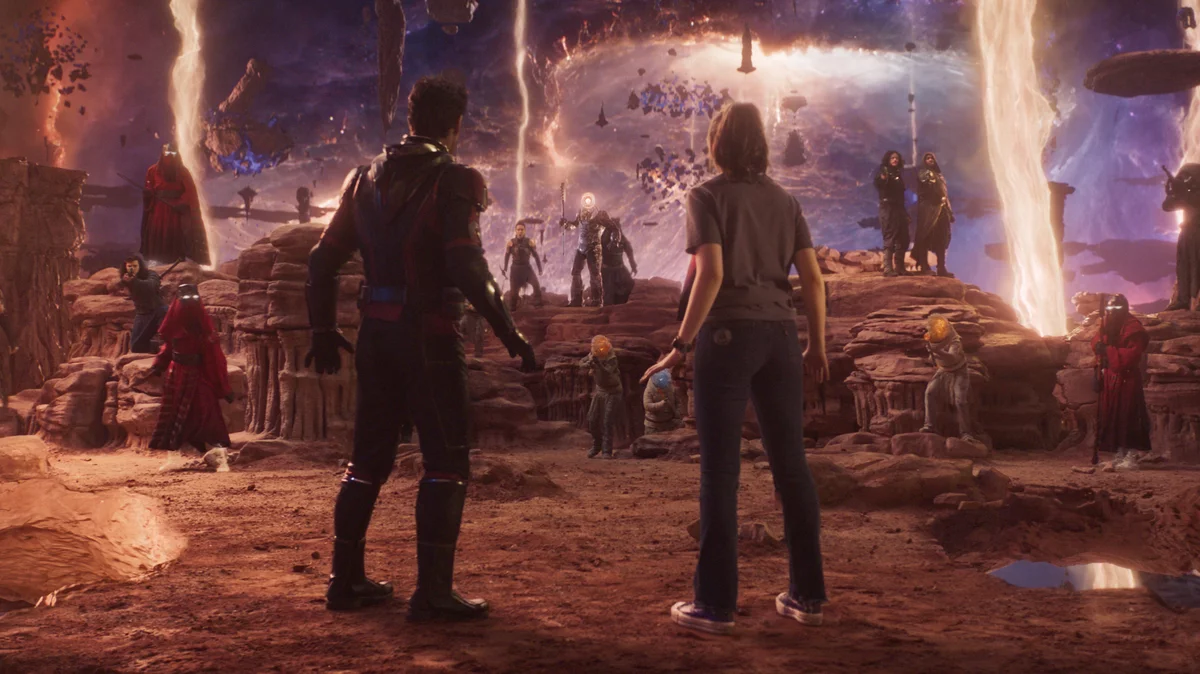The MCU Gets Lost in the Quantum Realm in 'Ant-Man and the Wasp: Quantumania'
Chrishaun Baker explains why nothing feels real in the latest Marvel film.

Editor’s Note: I’m excited to introduce you to a new writer on Decoding Everything. Chrishaun Baker is a freelance writer and filmmaker whose words can be found over at Inverse, Film Cred, and Dread Central. A lifelong comic book nerd with a love of rap music and post-punk, his favorite movie of all time might just be John Carpenter's The Thing.
My hope is that Chrishaun will be the first of many talented up-and-coming voices you’ll find here. In the meantime, please enjoy his thoughts on Ant-Man and the Wasp: Quantumania. Note that this review discusses the plot of Quantumania and contains some minor details about the third act of the film.
It might be hard to imagine a time prior to this, but nine years ago, the MCU crossed a cultural threshold that pretty much sealed the deal on the direction of blockbusters for the next decade and beyond. After the thunderous success of The Avengers back in 2012, Marvel Studios started rapidly expanding, using Phase 2 as a launchpad to explore some of the more outlandish concepts from the comics. It’s easy to dunk on the MCU’s effortless brand of populist escapism now that it's begun to cannibalize itself, but back in 2014, we were flabbergasted by the fact that James Gunn and Kevin Feige had given us a giant sentient tree and a talking raccoon. Not only did it work, but it also taught audiences that no character, storyline, or concept was too big or ridiculous to be adapted with sincerity, care, and visual finesse.
That was nine years ago. That MCU is gone.
Ant-Man and the Wasp: Quantumania, the 31st release overall and the first release of Marvel’s foreboding Phase 5, eschews what fans of both characters have come to expect from their outings. The Ant-Man series has always coasted on irreverent humor, and while the movies have never basked in the same spotlight as Guardians or Black Panther, they certainly distinguished themselves by their refreshingly small-scale conflicts…until now. Trading out the tiny heist stakes of the first two films, Quantumania sees our lovably hapless Avenger Scott Lang stranded inside the Quantum Realm, a subatomic pocket dimension, along with his mentor Hank Pym (Michael Douglas), his formerly-stranded wife Janet (Michelle Pfeiffer), their daughter Hope (Evangeline Lilly), and Scott’s own daughter Cassie (Kathryn Newton). As they scour this new alien world for a way to get back home, they’re pursued by the ruthless Kang the Conqueror (Jonathan Majors), an interdimensional despot with plenty of angst and a mysterious connection to Janet’s time in the Quantum Realm.
At least in theory, Quantumania is trying to emulate the sweeping bombast of adventure films like Peter Jackson’s King Kong or the theatrical Star Trek films – movies that awe us with the excitement of exploring exotic and fascinating locales. It’s a shame, then, that the whole affair is a frustrating failure of immersion on every front; at no point does the Quantum Realm ever feel like a real or even tangible place, and it would be too simple to lay the blame at the feet of overworked VFX employees. Rather, the film’s aggressively flat and static camerawork leaves no room for scale or depth, making it impossible to believe that our actors are ever truly interacting with the microbial world around them. It’s frightening to think that this is the same Bill Pope whose dynamic camerawork brought to life effects-heavy spectacles like Army of Darkness and The Jungle Book, and to make matters worse, the release of Avatar: The Way of Water just two months earlier makes the visual lifelessness of the Quantum Realm feel worse in comparison.

Although Peyton Reed might not be the most stylistically daring director in Marvel’s current rotation, the Ant-Man films have largely built a reputation for relying on solid and endearing character dynamics, which makes it so baffling that almost none of that is in here. It’s understandable why Scott’s security crew doesn’t show up (yes, including Michael Peña’s fan-favorite Luis), but the movie’s strange decision to separate the Lang and Pym families results in Evangeline Lilly’s titular Wasp taking a bewildering and awkward backseat. Michael Douglas is having a great time (as he is wont to do in these movies), and Michelle Pfeiffer gets a bit more nuance to chew on, but it’s obvious the movie has little interest in their small scraps of rote character drama.
The majority of the film’s runtime is dedicated to the relationship between Scott and Cassie, who’s frustrated at her father for not using his powers to meaningfully help people more. There’s an earnest attempt at emotional catharsis in their plot, and Newton and Rudd are both fine actors in their own right, but the movie spends no time building up their chemistry. After getting two films with young Abby Ryder Fortson in the role, Endgame’s five-year time skip briefly introduced us to Emma Fuhrmann’s aged-up Cassie before recasting her for this very movie. As far as character introductions go, Quantumania only needed to pull off a few of them, and Cassie’s suffers the most because she’s not given any depth beyond existing as a headstrong teenage placeholder for a future Young Avengers role.
It’s probably a good thing that the other character they needed to pull off, Kang the Conqueror, is played with exceptional gravitas by Jonathan Majors. The more serious of the film’s two villains (to say nothing at all of Corey Stoll’s embarrassing portrayal of M.O.D.O.K. would be a blessing), Majors' performance here lays the groundwork for the villain’s iron grip over the course of the next phase, and he’s certainly exciting in his menace. He might not have Killmonger’s nuance or Thanos’ physicality, but he comes to life with an operatic screen presence that is a welcome breath of fresh air in a franchise still struggling with boring villains.
Kang’s subjugation of the inhabitants of the Quantum Realm makes up the film’s main conflict, but the film does embarrassingly little to articulate their oppression. The “Quantum People” are a vague collection of bad space opera cliches, NPCs who spout generic dialogue about “revolution” in-between painfully unfunny quips designed to strip the film of any dramatic tension whatsoever. The film’s third-act battle is so utterly weightless that its inevitable resolution from a comically unearned deus-ex-machina feels par for the course set by the last two hours.
Back in 2014, the MCU still had something to prove – to get where we are now, they built an empire on larger-than-life characters that had to feel corporeal. Nearly a decade later, Ant-Man and the Wasp: Quantumania feels like a sharp reversal of that authenticity. Nothing feels quite real and the stakes never feel like they matter, because ultimately the only thing that does is laying the groundwork for what’s to come. Only the future knows if rumors about the MCU’s new focus on quality over quantity are true, but if not, it might be time to exile these movies to a dimension beyond time and space. -Chrishaun Baker
Enjoy this post? Consider subscribing!
Stuff David Chen has made
- On Tiktok, I contemplated why Quantumania is scoring so low on Rottentomatoes. I also expanded on these thoughts in audio form over on my personal Patreon page [PAID ONLY].
- On the Filmcast, we reviewed Magic Mike’s Last Dance, a disappointing conclusion to what is otherwise a fascinating trilogy. Be sure to check out my written thoughts on the matter as well.



